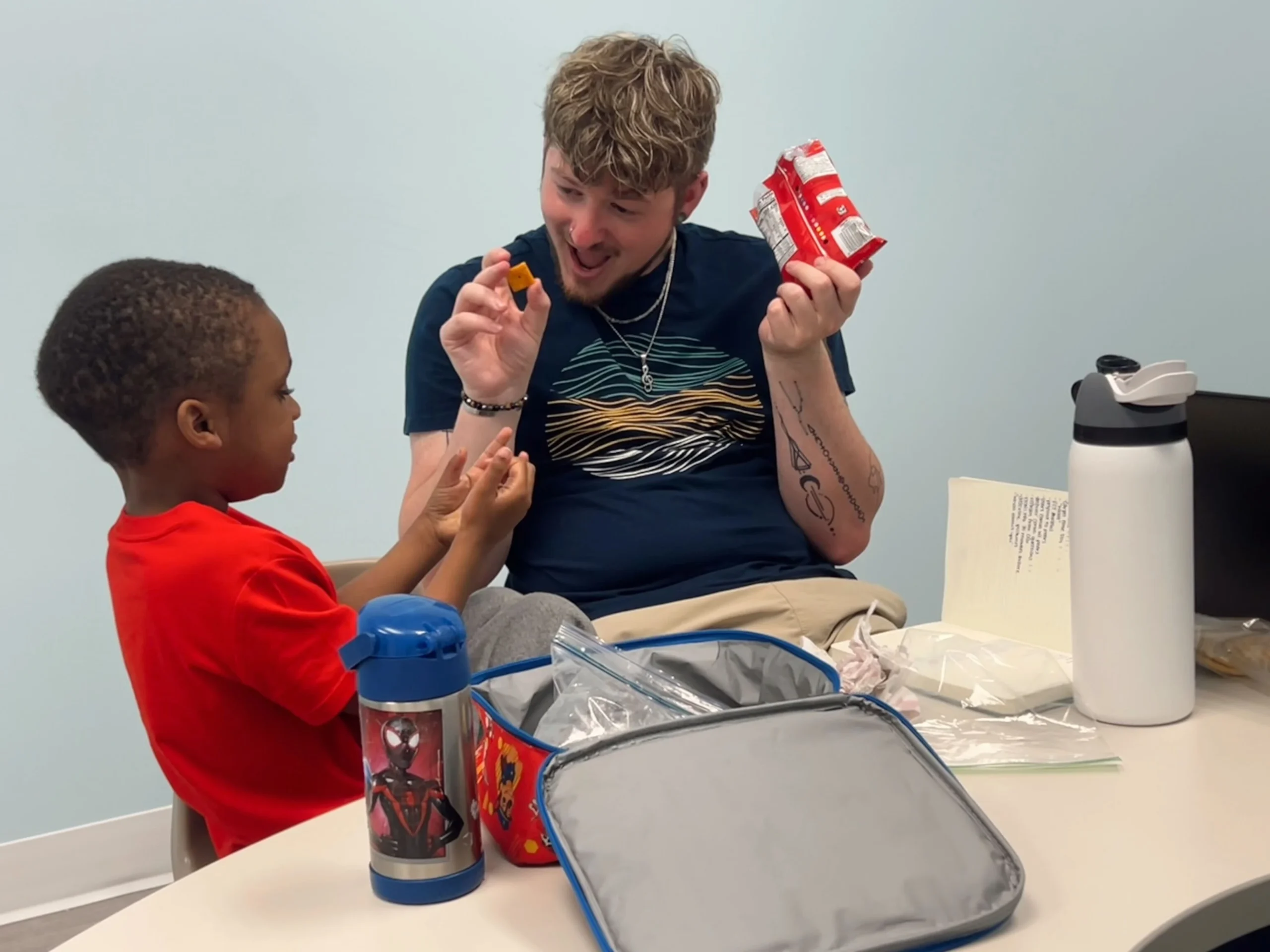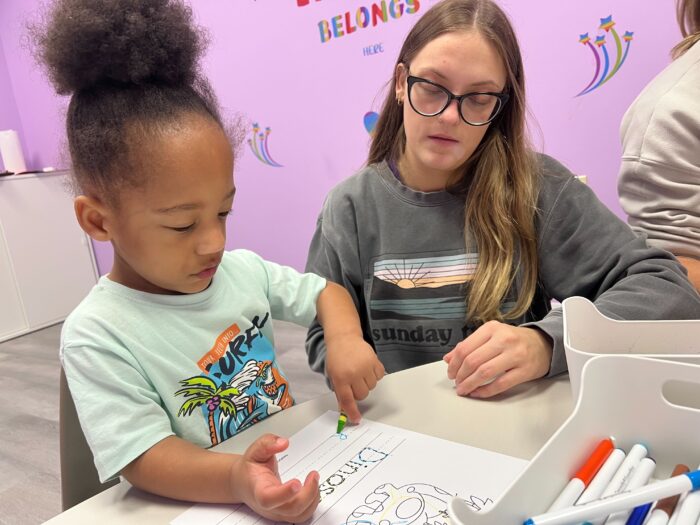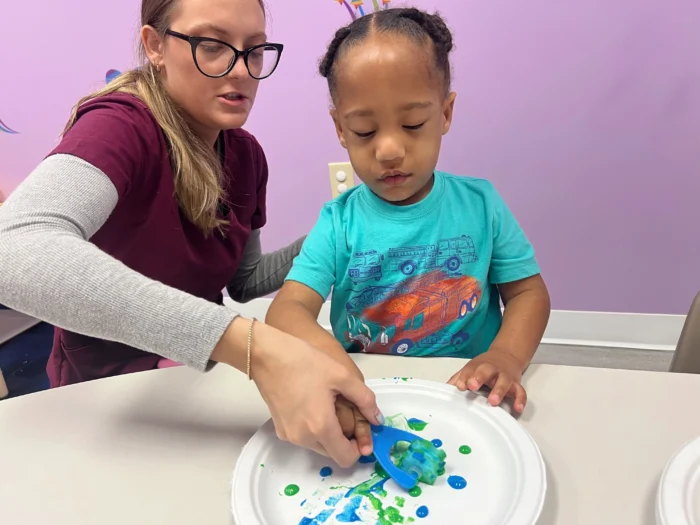
In this guide, we’ll answer the questions parents most frequently ask about in-home ABA therapy. We’ll explore its key benefits and goals, look at what typically happens during these sessions, and share practical ways you can create a supportive environment for your child’s development.
Since founding Abacus Therapies in 2017, we’ve provided home-based Applied Behavior Analysis (ABA) services for children on the autism spectrum and we’re excited to share our experiences and insights to help you understand if in-home ABA therapy is right for your family.
The Benefits of In-Home ABA Therapy Services
Every child with autism is unique, with their strengths, challenges, and goals. This understanding guides our personalized approach to therapy.
It also means families get to choose the place where therapy takes place, according to what best suits their particular conditions.
If your child is beginning ABA in-home therapy, here are three key advantages of choosing an in-home setting:
Convenience
Having daily ABA sessions at home allows your child to learn new skills without disrupting their existing routines. This benefit extends to parents too, eliminating the stress of commuting, adjusting schedules on the fly, and packing meals. That way you can focus entirely on your child’s journey.
To make getting started as smooth as possible, we conduct the initial assessment at your home—right where therapy will take place. That way, we can better understand your child’s environment and begin building a personalized plan from the start.
Familiar Environment
When therapy happens in your home, your child learns new skills in a setting where they already feel comfortable. This familiarity makes it easier to incorporate these skills—especially early self-care abilities—into their daily routine. This can be particularly beneficial for children just starting ABA therapy.
Additionally, interacting with your child in their natural environment helps therapists assess their needs more accurately and develop a more effective, personalized plan.
Family Involvement
We strongly encourage parents to participate in therapy sessions, which is much more practical in a home setting.
Your involvement adds to your child’s sense of security while allowing you to witness their growth firsthand and celebrate achievements together. You’ll also have more frequent communication with your child’s therapist compared to other settings.
Your therapist will provide valuable feedback and strategies to help you reinforce newly learned skills outside of formal sessions, creating a consistent approach throughout your child’s day.
Goals of In-Home Autism Therapy
While treatment goals always depend on your child’s specific needs, some common objectives of in-home therapy include:
- Developing essential self-care skills
- Learning to communicate thoughts and needs
- Manage frustrating situations
One difference between in-home therapy and center-based options is that centers may offer more opportunities for group therapy.
However, this doesn’t mean children can only develop social skills in group settings. In-home therapy can effectively teach children to engage meaningfully with people around them, especially with parents and siblings involved in sessions.
To ensure each child has optimal conditions to thrive, we provide sessions in multiple settings: at school, home, and at our ABA center in Charlotte, NC, where we also organize group therapy activities.
At-Home ABA Therapy for Kids of Different Ages
At Abacus Therapies, our approach focuses primarily on each child’s unique needs. Since these needs evolve as children grow, age is an important factor in developing an effective therapy plan.
Toddlers
For toddlers, our primary goal is establishing a solid developmental foundation.
This includes teaching essential self-care skills they can incorporate into daily routines—using the toilet, getting dressed, brushing teeth, and eating meals.
Emotional outbursts are common at this age, so therapy plans will include strategies to teach parents how to manage these situations, while teaching children more effective ways to communicate their needs.
School-Age Children
For school-age children (around the age of 6 or older), therapy often focuses on developing social skills that help them connect with peers.
While some children benefit from center-based therapy for social skill development, others achieve these goals at home with participation from family members and friends.
When conducting ABA therapy for 6-year-olds with autism (and older), we also emphasize skills that support academic success and classroom participation.
Teenagers and Adolescents
While teenagers rarely begin ABA therapy for the first time, many who started earlier continue to benefit from sessions during adolescence.
For teens, therapy typically focuses on communication and independence skills—preparing meals, scheduling appointments, and even preparing for job interviews. Time management becomes increasingly important during this stage, so therapists address this skill as well.
It’s important to note that while these are common developmental focuses, goals often overlap across age groups. Our team approaches each child individually to create a fully customized therapy plan that addresses their specific needs and uses their strengths.
How to Prepare for Home-Based ABA Therapy
Although in-home therapy is convenient, beginning the process requires some preparation. Here are practical steps to create an optimal environment for successful therapy sessions:
Choose a Therapy Space
In our experience, children achieve the best results in their natural environment, so there’s no need to designate a separate “therapy room.” Simply choose the space where your child would normally spend time during session hours to maintain comfort and routine.
Having access to a space with minimal electronic devices and distractions can be helpful for certain activities, but your therapist will let you know when this might be needed.
Prepare the Tools
During sessions, your Registered Behavior Technician (RBT) may use sensory tools, puppets, puzzles, and other toys to help your child learn new skills. After each session, store these items away and only bring them out before the next session begins.
When these toys are only available during therapy time, they remain special and effective as teaching tools.
Develop a Routine
ABA therapy centers on developing routines, and sessions provide an opportunity to establish one. Talk with your child about what to expect when the therapist arrives—for example, greeting the therapist and sitting at the table to begin.
To help your child become comfortable with this routine, especially when first starting therapy, practice it a few times before each session.
Be Present
While family members can continue their normal activities during sessions, a responsible adult must always be present. We encourage at least one parent to observe sessions and save any questions for after the session ends.
Depending on the specific activities and goals, parents and siblings may also be invited to actively participate in sessions.
Ask for Guidance
As a parent, you play a crucial role in your child’s development journey, but you’ll likely need guidance along the way. That’s why we offer specialized ABA training sessions for parents, where you’ll learn how to create a supportive home environment and implement ABA techniques to help your child’s growth.
Start Your ABA Journey with Abacus Therapies
At Abacus Therapies, we strive to provide the best possible in-home ABA therapy experience for children and their families. Our qualified and experienced therapists will consult with you and your child to develop a customized plan addressing your child’s specific needs.
We’ll keep you actively involved throughout the process to ensure your child achieves meaningful progress.
If you’re ready to begin home-based ABA sessions, schedule a free consultation with us. Call us at 954-400-3251, text us at 954-758-8748, or use our online contact form.
FAQs
Can you do ABA therapy at home?
Yes, ABA therapy can be conducted effectively at home. Beyond convenience, home-based therapy allows children to learn new skills in a familiar environment, enhancing their sense of security. It also creates more opportunities for parent involvement.
What does in-home ABA therapy look like?
In-home ABA sessions are typically one-on-one sessions where a certified therapist works with your child to help them feel supported. Therapists use various tools like sensory items, puzzles, puppets, and other engaging toys to help children develop self-care and communication skills.
What do parents do during in-home ABA therapy?
Parents are encouraged to observe therapy sessions and participate when appropriate. Parent responsibilities include preparing the therapy space, implementing therapist-recommended techniques outside of sessions, regularly communicating with the therapy team, and providing feedback about their child’s development.



